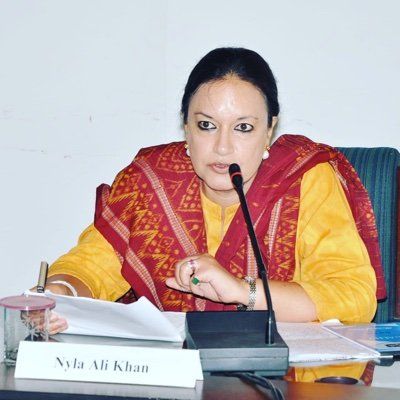University of Oklahoma visiting professor explores life of her grandfather
Nyla Ali Khan knows well the power of her pen. The writings of this
University of Oklahoma professor and granddaughter of a former
Kashmiri prime minister are making headlines in both India and Pakistan.
Khan’s extensive family history, particularly the portion pertaining to the leadership of her late grandfather Sheikh Mohammad Abdullah, has been at the center of South Asia’s political debates for decades. Now, after spending years on her own academic quest to discover the truth of her grandfather’s ideals, Khan, a noted scholar and author on Kashmiri culture and politics, is addressing her grandfather’s critics through excerpts from her books that are being published by some of India’s and Pakistan’s major newspapers.
“Propaganda machines of states and militant groups can be so strong that they can erase history without us realizing how our history is slowly and gradually being done away with,” said Khan, an adjunct associate professor in OU’s Women’s and Gender Studies Department. “What I find very interesting is that the younger generation- because of the propaganda of militant groups, the propaganda of the Indian state as well as the Pakistani state- don’t know enough about this man who was a Kashmiri nationalist first and foremost, the man who gave the people of that place a sense of identity. He laid the foundation of resistance politics in Kashmir and of the notion of fighting for self-determination.”
In 1947, India gained its independence from British rule and partitioned into India and Pakistan. The state of Jammu and Kashmir, which lies roughly north of both countries, acceded to India. The accession occurred after tribal invaders from Pakistan attacked Kashmir, causing its monarch to seek military support from India. The Indian government agreed to provide aid to Kashmir under the condition of accession, Khan said.
However, it was understood that once the warring subsided, a plebiscite would be held under United Nations auspices that would give the Kashmiri people the right to decide whether to stay with India or accede to Pakistan, Khan said. Some Kashmiris felt an option for independence should also be added to the discussion since Kashmir had been autonomous before the invasion.
In 1948, Khan’s grandfather, Sheikh Mohammad Abdullah, became prime minister of Kashmir, and by 1953 Abdullah, who was a strong advocate for Kashmiri independence, began to openly question whether the Indian government would organize the plebiscite since efforts had not been made to do so, and still have not to date. Even though he took a peaceful approach, his display of skepticism-coupled with his ideas of an independent Kashmir-and the popularity it gained by others who shared his views, is what caused Abdullah to be deposed and imprisoned by the Indian government for the next 22 years, Khan said.
“It was like everyone was happy with the status quo, and he questioned that. And, he could see that the autonomy of Kashmir was being eroded slowly and steadily,” Khan, 41, said. “Slowly and steadily it was being integrated into the Indian union, which he thought was highly questionable.”
Khan, who grew up in the Kashmir Valley amid the controversy, concedes she has questioned her grandfather’s ideologies. However, through her own research, which includes various books about Abdullah found in American libraries and articles from American newspapers (that are not accessible in Kashmir), she has been able to formulate a broader perspective of Abdullah and to have her research published in Indian and Pakistani newspapers, she said.
Khan initially had concerns about how her writings would be received since she is Abdullah’s granddaughter, but establishing herself as an academician has given her both the courage and the platform to write about him, she said.
“As a child, it was difficult for me to deal with the way this man I had placed on a pedestal my entire life was being vilified and demonized,” said Khan, who holds a doctorate from OU in postcolonial literature and theory. “So I became skeptical and ambivalent about his role, and for the longest time, I wasn’t really sure about which portrayal of his life I subscribed to. I wasn’t sure whether I saw him as a hero, or a savior, whether I saw him as a politician with vested interests or a visionary. So, I did go through that period of confusion.”
“My writings on Kashmir have given me a chance to try to understand the politics of the place with as much objectivity as possible and to try to understand the politics espoused by my grandfather and the ideology that drove him and his political organization. I think it is important to understand that Sheikh Mohammad Abdullah and the history of Kashmir were inextricable for the longest time and even now, even though he died in 1982- so he has been dead 30 years- even now, he is the largest political actor on the landscape of Jammu and Kashmir.”
In 1975, after engaging in negotiations with then Indian Prime Minister Indira Gandhi, Abdullah was released from prison and became chief minister of Jammu and Kashmir, and he maintained that position until his death at age 76. In an accord between Indira and Abdullah, Kashmir was affirmed as a constituent unit of India, but allowed to continue a form of autonomy within the union. Khan said her grandfather’s detractors accuse him of compromising his original position of self-determination in the negotiations. However, the only thing that changed was his methodology, she said. Abdullah held the same position, but decided to take his struggle from the streets to the conference table, Khan said.
Abdullah recognized that by 1975 the geopolitical scene had changed in Kashmir. While he was in prison, Kashmir’s leadership, which was installed by the Indian government, seemed to further institutionalize the state and gradually muffle its voice, Khan said. With all of the changes, Abdullah wanted to once again raise the consciousness of self-determination- even if he had to do it within the confines of the Indian constitution, Khan said.
“What is interesting about the people who accuse my grandfather of compromising is that none of those people did anything to further the cause of self-determination while he was in prison,” she said. “In fact, they were willing participants in elections organized by India. However, I believe, and even one of his detractors has written this, that if he had lived longer, he probably would have been imprisoned again for raising the banner of self-determination once again.”
Abdullah’s funeral is recorded as one of the largest in the Indian sub-continent with more than one million attendees- a fact that Khan says is “a slap in the face” to his critics.
“My detractors level the allegation that I ‘eulogize’ Sheikh Mohammad Abdullah,” Khan states in one of her excerpts. “But I believe, with the force of my conviction, that he, with all his contradictions, was a force to reckon with.”
Khan has published three books: The Parchment of Kashmir: History, Society and Polity, The Fiction of Nationality in an Era of Transnationalism, and Islam Women and Violence in Kashmir Between India and Pakistan. Her fourth book, A Labor of Love, will publish later this year and will share the life story of her grandmother and Abdullah’s late wife, Begum Akbar Jehan Abdullah.
Dr. Nyla Ali Khan





